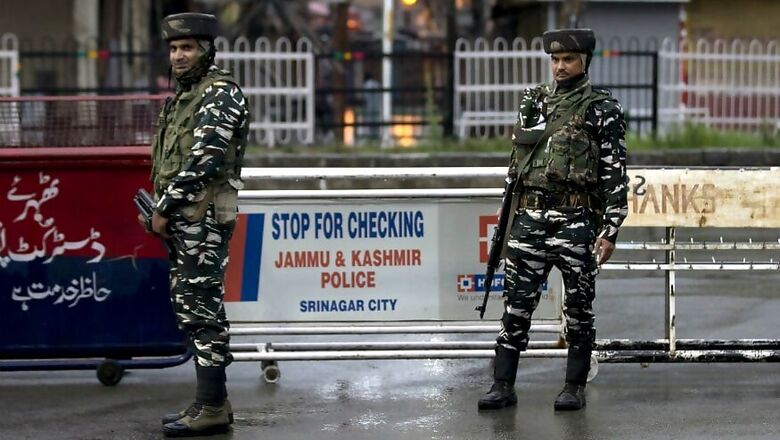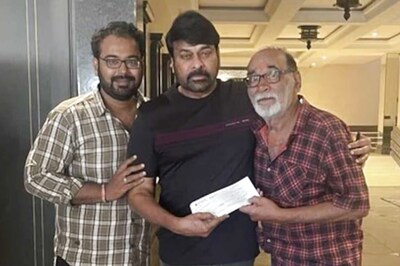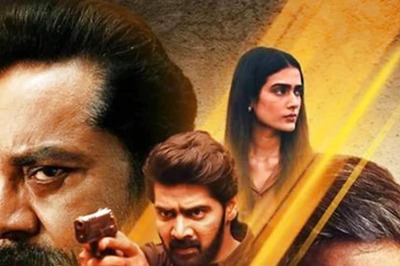
views
The Valley of Kashmir has always been projected in the news as a place of dissent and secessionism. We went to Kashmir in October 2019 with trepidation. We had been overwhelmed by a steady national and international agitprop over the Indian government’s reading down of Article 370 and 35A on August 5 and the subsequent territorial reorganisation with respect to the former state of Jammu and Kashmir.
We were sure that we will be greeted with raging tempers in the Valley. We came back with the feeling that there is a Silent Constituency of Wisdom in Kashmir. This constituency has had its voice choked, replaced and used by sheer terror and intimidation from across the border and from over ground supporters of underground terrorists in Kashmir and in Delhi.
The beautiful valley of Kashmir is caged by its elites. As we write this, the world is seeing Lebanon, Iraq and Chile rise against its oppressive elites. In Kashmir, the cages are too strong and unrelenting for any such protests. Over the years, the elites in Kashmir with their cross-border comrades have built mental walls of special identity for the people of the Valley.
Geo-politics and terror-economics had taken over Kashmir for the past 70 years. As a result, the normally gentle and hospitable Kashmiri was handed over a most horrendous existence. Even amidst such continuing terror, the wise Kashmiri is holding forth.
We met the silent wise Kashmiris who told us that they want to communicate directly with the government of India. They do not trust middlemen politicians. Most people we met felt that initiatives by the UPA, like formation of Working Groups and appointment of interlocutors were disappointing. They felt that in Kashmir so far the status quo has been deliberately maintained to keep the conflict raging seemingly for political and vote-bank interests.
The common Kashmiri lost his sons to the street violence unleashed by Kashmiri elites in 2008, 2010 and 2016. Blood flowed on the streets of Kashmir while the elites and their families were safe in Delhi and abroad. The resentment against civilian killings continues and there is latent anger which sometimes gets vent through occasional protests in some parts of Valley, particularly old Srinagar, Baramulla and Sopore.
There is clearly a sense of sadness over the 2010 agitations in Kashmir. However there is also a sense that this injustice can be overcome by controlled expression of empathy with the Kashmiris, by the new dispensation in Delhi. One of the respondents spoken to on this issue said that if the government wants to set a positive tone to their Kashmir handling, it should begin by responding to 2010 civilian killings.
The people we met in Kashmir felt that the Modi government should send across a healing touch for Kashmiris. They need to be told that their lands and jobs are safe. Kashmiris need to be given the feeling that they are citizens of the country and deserve all opportunities of growth and prosperity. The government needs to focus on cases of youth especially students who are detained/jailed on various charges.
The government needs to reach out to the families whose children died in 2010 street violence. Measures need to be taken to rehabilitate those injured, and families approached to provide them all kinds of possible help in the education and employment of their children.
There is also considerable feeling that the stone-pelting populace in the Valley is largely remote controlled by elite Kashmiris living in or having links with Delhi’s elites. This is aided by a well-orchestrated propaganda by well-placed Indians in India and abroad. We were told that the anti-India voice from Kashmir is loved in Delhi’s Universities.
Kashmir’s secessionists use university infrastructure in Delhi to propagate their agenda. They get prime scholarships and support to network abroad. One person we met told us laughingly that there are many Fai’s in our workplaces.
On the other hand, there are many locally active groups comprising professionals ranging from media persons to doctors who are contributing voluntarily in sensitizing youth about issues of J&K who are ignored and marginalised by both the state and the Centre. In the hyper-active political environment of Kashmir, such groups need to be encouraged by the government.
These persons and groups are a resource for any government and they need to be identified, encouraged and brought together on a common platform. Wrong kind of people, International NGO’s, were promoted by the UPA.
We met Sikhs who openly told us that their independence day is on August 5, 2019. We met Kashmiri Hindus in transit camps who told us that they would like to stay in safe zones in the Valley if possible, with their Muslim brethren. We met a small yet dedicated group of Kashmiris Muslims who are unambiguously against the Pakistan-backed militancy and who speak and write about the human rights violations committed by the militants. They don’t deem the separatists a sacred cow beyond accountability.
We met brave police officers who are in the line of the fire from forces that work from across the border. Their lives are in danger; they have lost colleagues and are acutely aware that they are living on the razors edge. Despite the dangers, they are unambiguous that anyone who asks for rolling back the decision on Article 370 and 35A should be treated as an enemy of the state.
We met students in Baramulla who told us that towns like theirs were open and working in an almost every day manner after August 5. We met students from Kupwara who told us that their town was never shut.
The great geo-political game in Kashmir has played out in all its ugliness after August 5. We have seen Pakistan’s ISI targeting non-locals in Kashmir. Tourism is unlikely to survive this attack. There is a blatant attempt by terrorists to cripple the apple economy in the valley.
Kashmir is going through intense churning. It seeks freedom from corruption and bad governance and an outrageous, throttling, killing culture of oppression and uncertainty. Its brave men and women need a hand from fellow citizens in India.
Sonali Chitalkar is an assistant professor of Political Science at Miranda House, University of Delhi.



















Comments
0 comment